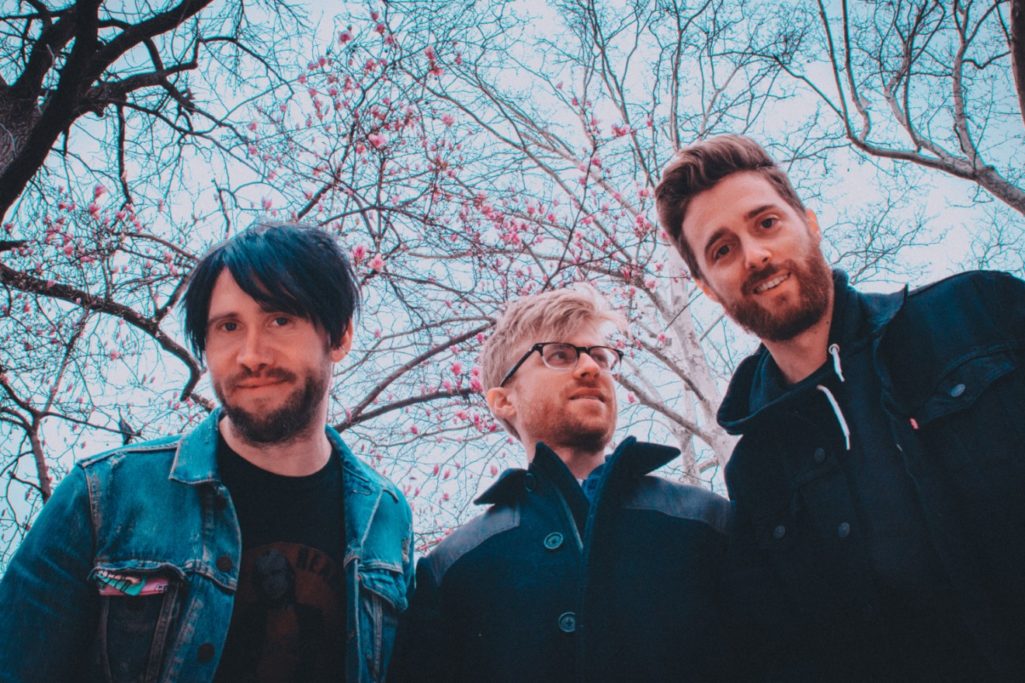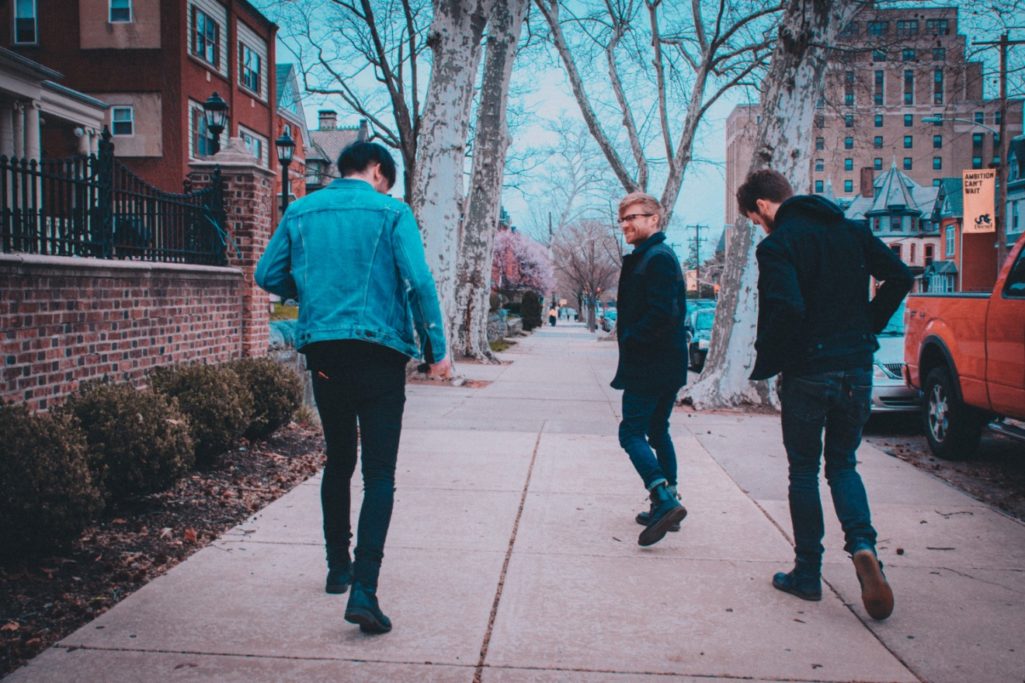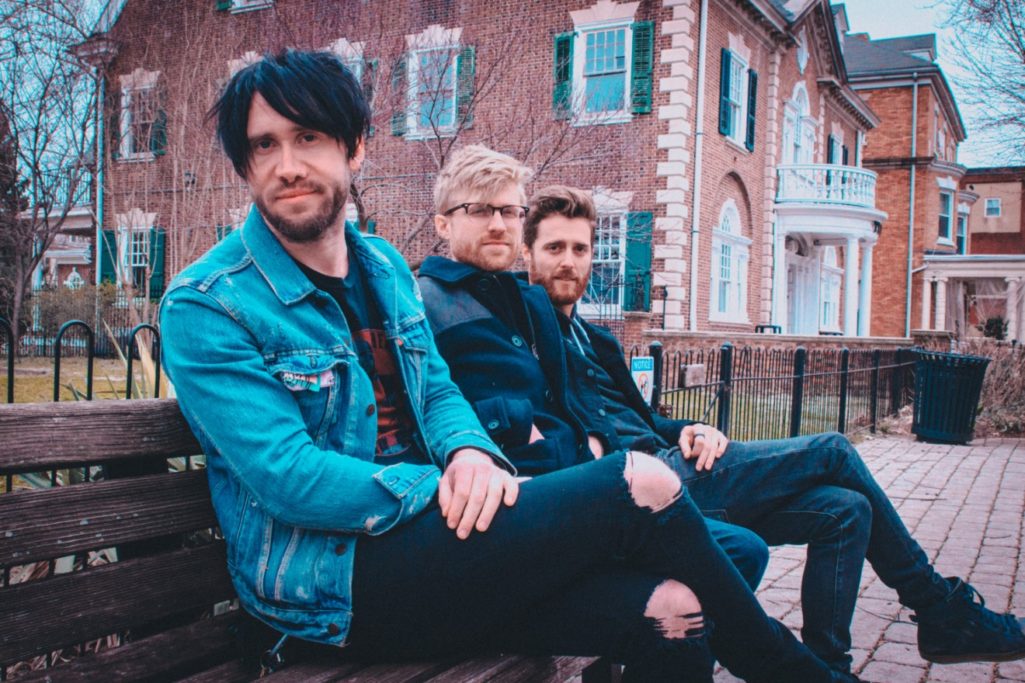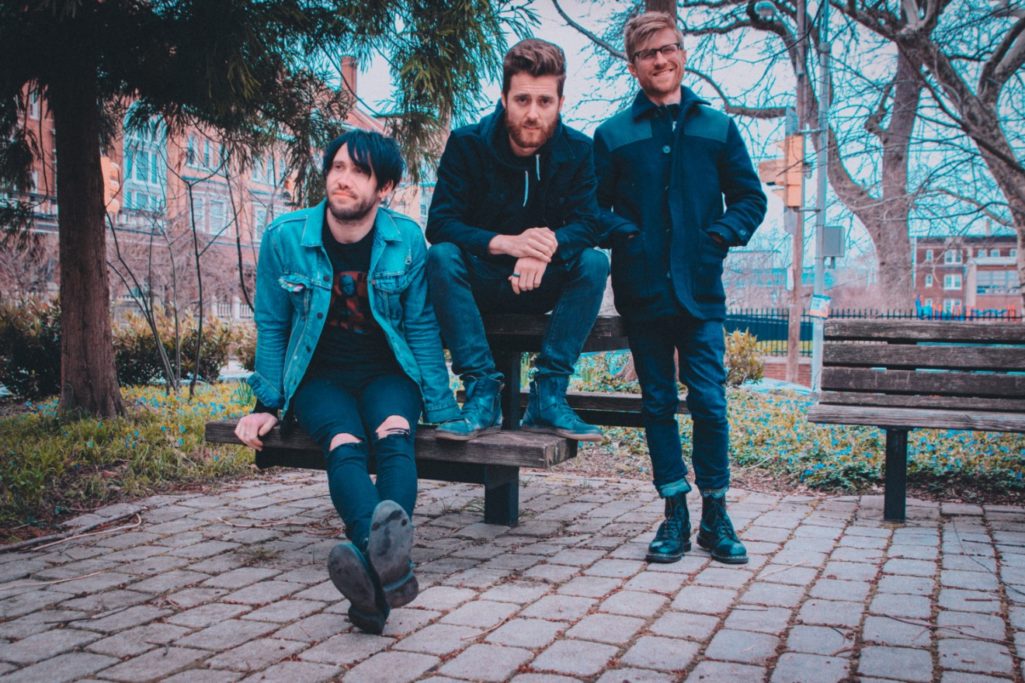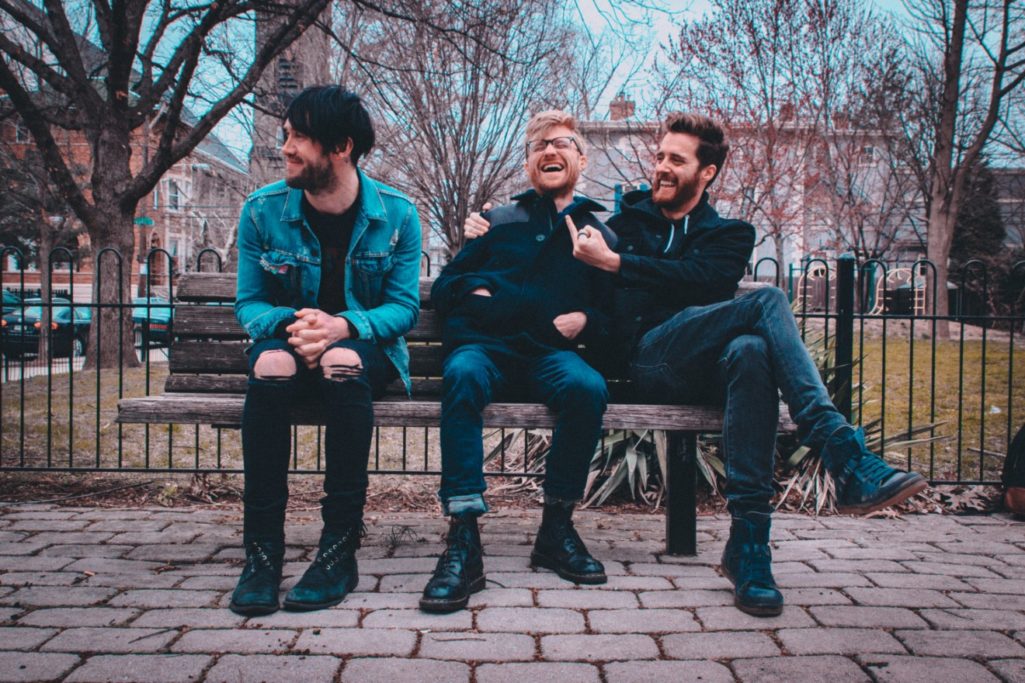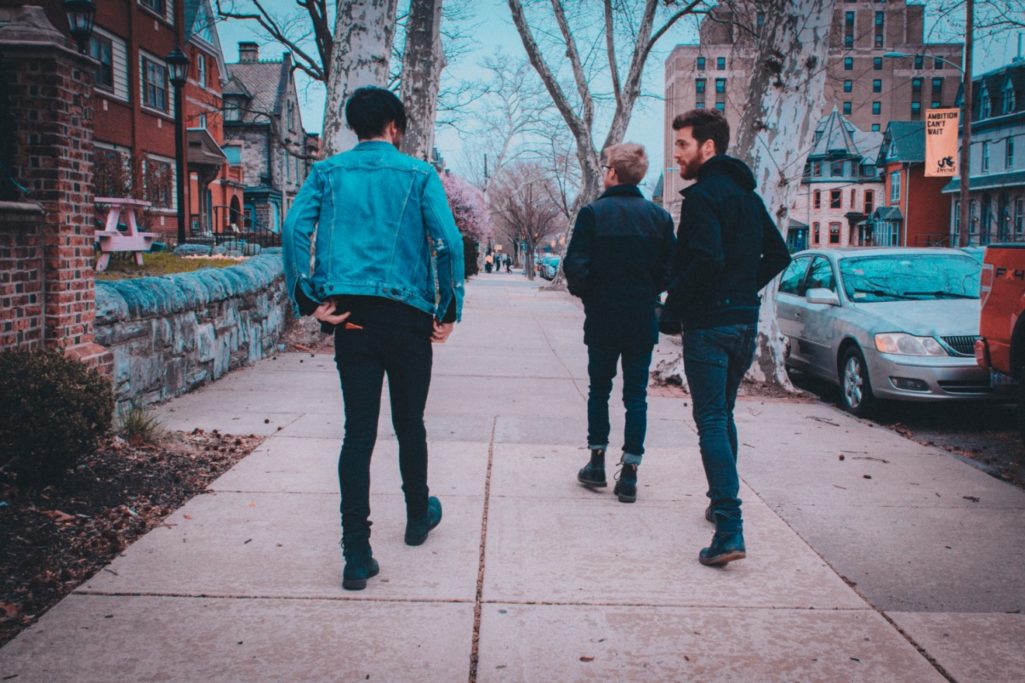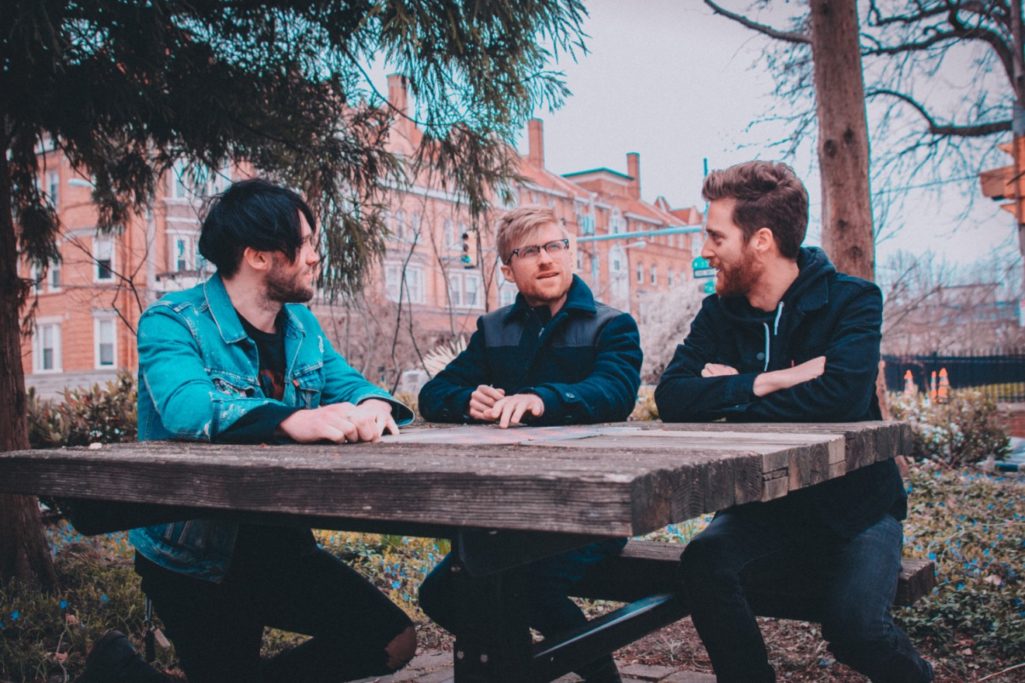In an art and industry as volatile as music, it can be very difficult to remain relevant for more than a few years, but Jukebox the Ghost has stood the test of time.
Known for their their exhilarating live show and intelligent but infectious pop songs, the Brooklyn-based trio of Ben Thornewill, Tommy Siegel, and Jesse Kristin combines a fiery rock ‘n’ roll attitude with classical training to arrive at a unique style that is accessible, yet interesting. Over the past decade, the band has been relentless in their touring, playing thousands of show, and continually evolving with their sound, as their fanbase has steadily grown. After (sort of) making their major label debut with their previous self-titled record in 2014, they have now gone completely independent for their fifth studio album, “Off to the Races.” Not sounding like or unlike anything they’ve done so far, Jukebox the Ghost is reinvigorated with a brand new batch of songs that appear to be their most introspective work to date, and in the only fashion they know, they are ready to hit the road to prove it.
Interview and Photography by Andy Gorel
Andy: You guys came together in DC and have since called Philly and New York home. How are the dynamics of the three cities different in terms of music and how have they affected your band?
Ben: We started in DC, so our DC days were spent being a college band, playing a lot of shows. When you’re in school, that’s your bubble. You’re part of the city, but you’re really part of the university. That was our world in DC until at the end we broke out of it.
Now Philly, we were touring out of here. We were parts of the lots of bands playing in warehouses scenes, and everybody hoofing it, doing the dirty Philly musician thing. We did that for four years, and now we’re in New York where it’s just a bunch of people paying too much for rent, but still making music.
Tommy: New York is too big to have a music scene. There are a lot of people playing music but it doesn’t feel like a scene. There are little bubbles like the Ridgewood punk scene, but there are too many to count. In Philly I remember distinctly feeling like there was a music scene.
Andy: At the beginning you were sort of a sci-fi pop band. How’d you guys arrive at this sound? It was a unique blend for sure.
Tommy: We were just trying to figure out who we were in college, and figure out what our sound was. Ben was writing a lot of quirky almost Vaudeville sort of pop songs and I was writing a concept record about the apocalypse. So that first record is just those two put together.
Ben: When you’re in college you write about all sorts of things, because you’re thinking about all sorts of ridiculous things. Later you look back on it and are like, “Did I really need to do that?” But it’s just part of becoming a human being I think.
Tommy: Yeah, it’s funny. There are pros and cons to it, but it’s fine to listen back to that older stuff. It’s almost wonderfully devoid of influence in some ways. Before you get bogged down by expectations, you’re like “Well I wanna write about spaceships.” So you just do it.
“When you’re in college you write about all sorts of things, because you’re thinking about all sorts of ridiculous things. Later you look back on it and are like, “Did I really need to do that?” But it’s just part of becoming a human being I think.”
Andy: What was inspiring or influencing you guys at the beginning? Musically or not.
Jesse: Generally speaking, when you’re in college it can be a time of musical discovery. I actually started listening to a lot of old music in college. That was also timing-wise, not to date us too much, but we had our fresh iPods, and it was really convenient to be listening to lots of music, like the indie rock of the time.
Ben: I was getting a degree in Classical Music and Composition. I was listening to tons of Shestakovich, and jazz progressions, and really modern classical compositions. So all of that stuff was seeping in and coming out in weird little ways.
Andy: Tommy and Jesse, what did you guys study at university?
Tommy: Journalism.
Jesse: Biology.
Andy: Your sound kept evolving over the years but kind of stayed true to your roots. Self-titled in particular was a leap into a new territory. What spurred the transition to take an outside the box approach with that album?
Tommy: I think up until that point we had done a lot of records how the three of us sound playing live, and that record was a conscious effort to let the studio guide the arrangements. I think now on this record we’re kind of coming back around – I think in a way our new record sounds more like our old records than our most recent one. It goes in and out but I think we’re getting to the point now where we’ve been a band long enough that we can kind of see the scope of our full career, and pick and choose things we like.
Andy: You guys were on a major label for like fifteen seconds.
Ben: As one does.
Andy: What was that?
Ben: Through a series of comedic errors, it all fell apart really quickly. We signed to them right after we released our last record. They re-released that last record. Right when we were getting ready to make what would have been this record, number five, something happened to the label, and the label itself disappeared. Cherrytree and Interscope stopped working together, and when that happened we got let out into the world.
Andy: Ah, I see.
Ben: And no hard feelings! It ended up working out great. We had lots of time to make the new record. It gave us some freedom. Now we’re self-releasing and it’s actually going really great so we’re thrilled about it.
Tommy: We’ve had plenty of friends’ bands who have had nightmare major label scenarios. Ours doesn’t qualify. We actually just had a year where we thought we were on a major label, and it was over. There was really no collateral.
Ben: It was amicable.
Tommy: And also, we didn’t get screwed by Interscope. Interscope could have kept us indefinitely and stopped us from making a record, and they didn’t. They let us go, which was great.
“We love putting on a good live show. We love touring, and that’s totally been our bread and better. I think relying on anything else in this music economy is a little risky.”
Andy: What was the mentality like? Like, “Oh shit, we’re getting ready for major label LP1 right now.”
Ben: We didn’t know. I think what was tricky was when you’re on a label, you know where the money is gonna come from to make an album. We didn’t know that this time, but other than that everything was normal.
Andy: What’s it like being a career indie band in the 2010s?
Tommy: I think we’re so used to having the rug pulled out from under us every few years, in terms of the musical distribution world. From MP3 to streaming, or MySpace to Facebook to Instagram. These things keeps changing every few years, so we have totally put our eggs in the basket of ticket sales and t-shirts. We love putting on a good live show. We love touring, and that’s totally been our bread and better. I think relying on anything else in this music economy is a little risky.
Andy: I think we’re in a bubble right now with streams follow counts, and “internet music” so to speak. Even if you’re a pop artist, your rock show still matters.
Tommy: We’ve been around long enough where, yeah, it’s great to have more Instagram followers, but in a year people might ditch Instagram completely.
Andy: Looking back at the first four albums – the new one doesn’t count because it just came out and every artist likes their new stuff the best – do you have a favorite or is their one in particular that you feel you really hit your stride on?
Ben: I think there are moments in all the records that we’re enormously proud of. They represented a time in our lives, and at the time were the records we wanted to make, always. I think you get things right and wrong, but you only learn that in retrospect.
Tommy: To me, we don’t have a quintessential record, but there are things I really like about each record. I really love the imaginative rock opera thing on the first record, and really like the retro Beatlesy thing on the second record. Third record, I love the way it sounds. Fourth record I think is just really tight arrangement-wise. We had never had songs that were mathematically precise pop songs. They all have quantities we really like, and things we don’t like. But honestly, I don’t go back and listen to our records. I could put one of them on and have a totally different opinion tomorrow.
Andy: How have you guys kept things exciting with having the same lineup for so many years, and having the same circuit of clubs you play, while being an indie band? There are a lot of constants. Is it as simple as you just love it?
Ben: I think it’s as simple as we love it. And we’re always threatening to kick Jesse out of the band which adds a level of stakes and danger.
Jesse: It’s very dangerous. Dangerous work.
Ben: There’s a triplet fill, and if he does it one more time he’s out. But he doesn’t know where he’s not allowed to do it.
Tommy: And we love eating old bananas at truck stops. So there’s no other way to do it than by travelling.
Jesse: They stay the same age.
Tommy: (laughing) They keep getting older, and we keep getting older too.
“We love being out on the road. What a rush to write that song, and a year later play it to people who are singing the words. What a crazy thing.”
Andy: You’ll play sometimes over a hundred shows per year when you’re in peak cycle. How have you maintained such a loyal fanbase, and is it still your favorite part of being a band?
Ben: It’s the part where you get to see the product, and it’s real. It’s all about the audience. We’re getting excited about this tour because we’re playing new songs for what will hopefully be a receptive audience. Which will breathe a whole new life into the shows.
Tommy: I think at their core, musicians are 50% drama kids – they need that outside validation, and we love being out on the road. What a rush to write that song, and a year later play it to people who are singing the words. What a crazy thing.
Andy: What’s the craziest run you’ve been a part of so far?
Ben: In 2009 we had a stretch where we did a full US tour, a European three week tour, back to a seven week American tour. And these aren’t comfortable tours. These are in a little van, and you get one hotel room, sleeping on floors. That was tough. They’ve gotten progressively easier since then, because we can afford hotel rooms.
Andy: Does the whole normal people job thing ever look enticing?
Ben: Always. It’s so glamorous. People don’t know how good they have it sitting at their desk. They get paid no matter what they do. They have somewhere to go.
Jesse: Insurance, staff meals.
Tommy: Health insurance, my God.
Ben: Donuts on Friday. C’mon.
Tommy: Free coffee (laughs).
Andy: So this new album. You spent a lot of time working on it. It seems to be cumulatively linear with every other album so far.
Tommy: I think this record plays like a Mixtape almost. Each track calls back different elements of our discography.
Andy: Tell me about the process.
Ben: We did a couple tracks like “Everybody’s Lonely” and “Fred Astaire” on the west coast with some producers who we wrote the songs with, and the rest of it we did in Studio G which is a great studio in Brooklyn. A beautiful old piano, gorgeous drum rooms. Very organic, lots done to tape. We got to take our time on it because we didn’t have a label. No one was breathing down our necks. We got to spend a year on it and make good creative decisions. It was a blast.
Andy: How long had you been writing songs for this album, and how many did you have to pick from?
Tommy: Ben and I write a million songs, and when it comes time to make a record, there’s usually 30-40 each. So it ends up being choosing from 70-80 demos.
Jesse: And this record in particular. If you think about the timeline between this record and our last. Self-titled was released on two different labels. So these guys started writing songs for this record – you don’t always think about it at the time, you’re just writing – but they started writing for “Off to the Races” in 2014. As soon as self-titled was done, these guys were writing songs. We also played so many songs that didn’t end up on the record. We always hope they get recorded, so we’ll see.
Tommy: But recording costs money, so.
“No one was breathing down our necks. We got to spend a year on it and make good creative decisions. It was a blast.”
Andy: Will any of the cuts that didn’t make it be popping up anywhere else?
Ben: There are four tracks we recorded that aren’t on the record, so those will be released at some point. And then you always hope the songs you write, no matter what, find a home. Whether it’s with us on a future record, or another artist decides to cut it, but hopefully they don’t go to the song graveyard. We’re always optimistic.
Andy: What are some of the aspects of your life and being as a band that have inspired the songs on this album?
Ben: I think getting older. This is record five so that speaks to age. We’re thinking about that. We’re thinking about socially perceived normalcy, like “People Go Home” or “Boring.” Just “work” and what that means, and what it feels like.
Jesse: “Jumpstarted” hints at having children.
Tommy: “Time And I” is kind of about the passage of time. There are a fair amount of songs on the record that are about the implications of getting older.
Andy: You said you’re excited to get back out on the road. This upcoming tour. Any hopes, expectations, etc.?
Ben: I think just to play the new songs, and feel the excitement of the audiences. We’re getting some radio play at the moment so hopefully that translates into new fans, and added energy. We haven’t toured like this in a few years.
Tommy: We’re so excited to just get out there.
Andy: Any 80s covers coming up?
Ben: 70s, and good one, I hope.
Tommy: Yeah, we got a good one we’re gonna debut in Philly.
Ben: “Mr. Blue Sky” by ELO.
Andy: What’s the worst cover you’ve done?
Jesse: Worst cover is easy. “Livin’ La Vida Loca” by Ricky Martin.
Ben: Yeah, that was really bad.
Jesse: That was my choice. It really did suck. I don’t think we got to verse two.
Ben: That was so bad.
Jesse: I tried to get us to verse two, but it couldn’t happen.
Andy: What about the best one?
Jesse: I do really like “Highway to Hell,” but it shreds Ben’s vocals. “Man! I Feel Like A Woman,” that one’s always fun.
Tommy: “Bohemian Rhapsody,” whenever we do Halloqueen is always fun cause you know everyone is gonna freak out. I love doing that one.


